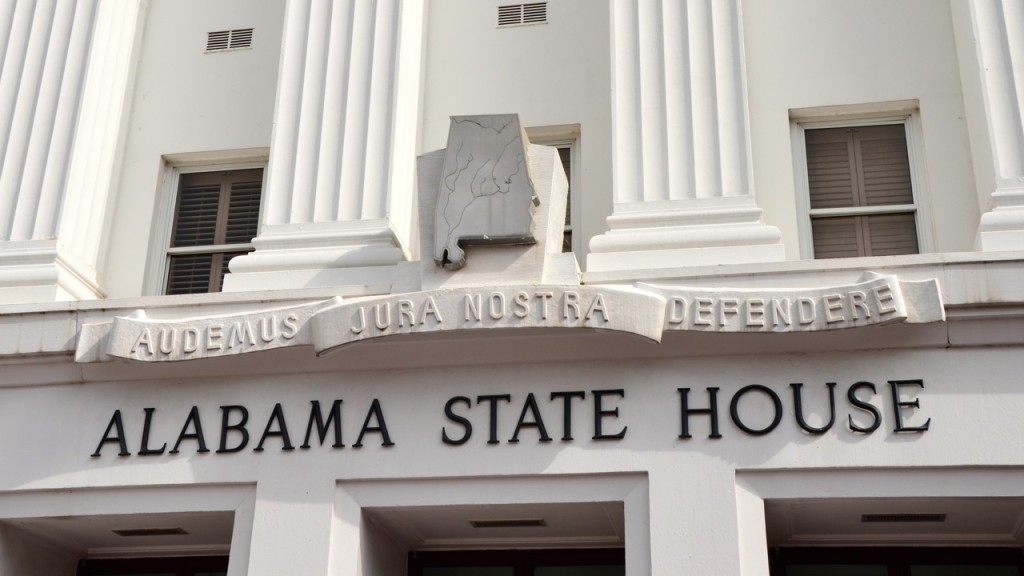Andrew Sorrell and David Sessions rank highest scorecards for Club for Growth Foundation

On Wednesday, Club for Growth Foundation released its annual legislative economic scorecard, which tallied up the 2021 legislative year based on criteria for “economic growth issues,” 1819 News reported. According to a release, Club for Growth Foundation based their scoring on each lawmaker’s record on votes related to “pro-growth policies and computed an Economic Growth Score on a scale of 0 to 100.” “A score of 100 indicates the highest support for pro-growth policies. The Foundation’s study examined over 2,500 floor votes and, in the end, included 21 Alabama House votes and 20 Alabama Senate votes.” According to the scorecards, Republican Senator David Sessions had the highest rating with a 35%. The lowest-rated Republican was Larry Stutts, with a score of 16%. The highest-rated Democrat Senator was William Beasley with 30%, and the lowest-rated Democrat was Kirk Hatcher with a score of 0%. For the House, Republican Andrew Sorrell was the highest rated Represenative, with a score of 95%. The lowest rated Republican was Dickie Drake with a 14%. The highest rated Democrat was Dexter Grimsley with a score of 20% and several Democrats rated lower than 6%. Other key takeaways include: Alabama Senate Average Republican Score: 27% (Up from 21% in 2020) Average Democrat Score: 11% (Up from 6% in 2020) Alabama House Average Republican Score: 28% (Up from 15% in 2020) Average Democrat Score: 12% (Up from 0% in 2020) “Through the release of this scorecard series, the Club for Growth Foundation is looking at how state legislatures perform in terms of pro-growth policies,” Club for Growth Foundation president David McIntosh said in a release. “We believe that this scorecard will help inform citizens and entrepreneurs about who supports the policies that promote economic prosperity.” According to their website, their mission is “to inform the general public about the many benefits of economic freedom and limited government.” Some of the Club for Growth’s top policy goals include: Reducing income tax rates and repealing the death tax Replacing the current tax code with a fair/flat tax The full repeal of ObamaCare and the end of abusive lawsuits through medical malpractice/tort reform Reducing the size and scope of the federal government Cutting government spending and passing a Balanced Budget Amendment to the United States Constitution Regulatory reform and deregulation School choice
Committees OK bills to allow Alabama casinos to operate bingo machines

Committees approved two bills Wednesday aimed at gambling halls VictoryLand and GreeneTrack to resume operations without interference from state law enforcement. The Senate Committee on Tourism and Marketing approved SB320 from Sen. William Beasley (D-Clayton), which would allow VictoryLand in Macon County to operate the same bingo machines being used by the Poarch Creek Indians at casinos in Wetumpka, Atmore and Montgomery. Beasley’s bill would codify the legality of the machines and allow the now-closed casino to resume normal operations. He said the bill would stand to reinforce the current amendment allowing bingo in the county and help to recoup the more than 2,000 jobs lost when the gambling hall was closed down. The bill was approved with little discussion. The House Committee on Economic Development and Tourism approved HB419 from Rep. Artis McCampbell (D-Livingston), does essentially the same thing as Beasley’s: It codifies the legality of bingo on electronic devices used by Native American casinos and establishes a gaming commission to oversee the operations. However, McCampbell’s legislation is a constitutional amendment, which means that, if it is passed by the legislature, the voters of Greene County would have the final say in whether or not is in enacted. Beasley’s bill will have to go before the governor if it is able to clear the legislature. Gov. Robert Bentley said last year that he has no further plans to go after gambling operations in the state. Further, Attorney General Luther Strange, who had previously taken the lead in unraveling many state gaming operations, has demonstrated an unwillingness to attack such operations recently. The two bills aim to ensure that the gambling halls are safe from prosecution once Bentley’s time has expired. After gaining favorable reports, both bills are slated to go before their respective houses when the legislative session resumes April 5.
Senate committee OKs Fetal Heartbeat Act

The Senate Health and Human Services Committee approved a bill Wednesday that would require physicians to check for a fetal heartbeat before and abortion and prohibit abortions if a heartbeat is detected. SB9 from Sen. Gerald Allen (R-Tuscaloosa) follows a laundry list of controversial bills filed by the Senator and defies previous Supreme Court rulings, which overturned similar legislation in other states. Allen’s bill makes no exception for cases of rape or incest, only in the instance of mortal threat to the mother. The bill further provides penalties for physicians who defy the law making the offense a Class C felony that carries a fine of $15,000 and up to 10 years in prison. Supporters of the bill alleged that studies have shown fetuses are more developed than previously believed, with one suggesting that fetuses are capable of sustaining memories. Opponents suggested that, because heartbeats are detectable as early as five weeks into a pregnancy, the legislation would prohibit many women from attaining an abortion. Further, opponents questioned the state’s ability to afford the lengthy legal battle that would likely ensue as a result of the bill’s passage. The committee passed the legislation with only Sen. William Beasley (D-Clayton) objecting. A similar bill has been filed in the House of Representatives by Rep. Terri Collins (R-Decatur) The committee also approved a bill from Rep. April Weaver (R-Brierfield) which would out law the already illegal practice of selling fetal tissue and parts. Again, Beasley was the only dissenting voice on the committee. Both bills will now go before the full Senate.
House committee approves two bills to loosen Alabama alcohol restrictions

The House Committee on Economic Development and Tourism approved two measures Thursday aimed at loosening alcohol restrictions in the state. SB219 from Sen. William Beasley (D-Clayton) would allow state and retail liquor stores to conduct liquor and wine tastings on premise. The measure would allow 10 percent of stores to do so in the first year and eventually move up to 28 percent within three years. The bill allows for two quarter-ounce tastings of liquor and four one-ounce tastings of wine. Joe Godfrey, Executive Director of the Alabama Citizens Action Program, was on hand to oppose the legislation, urging lawmakers to make it more difficult to get alcohol. “Alcohol is an addictive and mind-altering drug,” Godfrey said. “It destroys homes, it destroys families.” Gina Dearborn, who represented the Distilled Spirits Council, was in favor of the measure. Dearborn noted that 40 states already allow such tastings, and Alabama’s laws would be stricter than most – tastings must begin before 6 p.m. and manufacturers would oversee the tastings at no cost to consumers or retailers. The committee gave the legislation a favorable report by a unanimous vote. HB325 from Rep. James Buskey (D-Mobile) addressed a specific issue concerning Lake Patti Sue in Slocomb. The 160-acre property straddles a wet and dry county and the owner is hoping to sell alcohol at the recreational spot. Buskey’s legislation would allow him to do so, even on portions that sit within the dry county. The bill would make the lake a “commercial development district” and have no bearing on the parts of the county outside of the property. Similar bills have already passed. Again Godfrey objected, asking whether such a move is constitutional. “You’re imposing something on people who have not voted to go wet,” Godfrey said. “We keep inching and, eventually, the plan is for the whole state to be wet. I don’t believe that’s fair to the citizens of that dry county.” Rep. Tommy Hanes (R-Scottsboro), who lives in a dry county, concurred with Godfrey’s reasoning. “It goes against your people if they don’t want it to be wet,” Hanes said. The bill was given a favorable report with Hanes the only one to vote against it.
Alabama legislative agenda preview: March 7 – March 11, 2016

Alabama lawmakers will return to Montgomery Tuesday as the legislative session resumes, with the House convening at 1 p.m. and the Senate an hour later. Both chambers are still planning to tackle the General Fund and Education Trust Fund budgets before spring break, as well as a host of issues slated to be taken up this week. The Senate will debate SB89 from Sen. Arthur Orr (R-Decatur), which would require all Alabama public school students to pass a civics test to graduate – private schools could opt-in if they chose to. Also on the Senate’s agenda is SB148 from Sen. Jim McClendon (R-Springville), which would require all passengers in a vehicle to wear a safety belt. The legislation came up in last week’s session but was stalled due to opposition regarding further legislation on people’s car-riding habits. The Senate will also take up SB114 from Sen. Paul Sanford (R-Sanford), which would regulate “fantasy contests” in the state, and SB14 from Sen. Gerald Allen (R-Tuscaloosa), which would allow people to carry a firearm in their vehicle without a permit. Allen’s legislation was hotly contested in a recent committee hearing, when state law enforcement officers argued that the bill would make their jobs more difficult and dangerous. The House will also take up a bill aimed at regulating so-called “fantasy contests,” as well HB2 from Rep. Tommy Hanes (R-Scottboro), which would require wireless communications providers to supply law enforcement agencies with location information upon request. Perhaps the bills with highest interest to be taken up in the House this week are HB46 from Rep. Alan Boothe (R-Troy), which would allow Alabama distilleries to begin selling bottles for off-premise consumption, and HB13 from Rep. Alan Harper (R-Northport), which would allow the public to vote on whether or not to institute a state lottery. Committee hearings will get underway Tuesday morning before the start of session, though the majority will take place on Wednesday. The Senate Committee on Health and Human Services will hear discussion on two bills that will likely attract the outrage of Democrats – HB45 from Rep. April Weaver (R-Alabaster), which would outlaw the already-illegal practice of selling fetal tissue, and SB9 from Allen, which would prohibit abortions if providers don’t first determine a fetal heartbeat. The Senate Committee on General Fund Finance and Taxation will hear from Sen. Vivian Figures (D-Mobile) regarding SB136, a bill which would put forth a constitutional amendment to add an additional 5-mill tax to state properties, with the proceeds going to help Medicaid. The House Economic Development and Tourism Committee will hold public hearings regarding two alcohol-related bills – SB219 from Sen. William Beasley (R-Clayton), which would allow retail licensees and state liquor stores to conduct liquor and wine tastings, and HB325 from Rep. James Buskey (D-Mobile), which would allow businesses with a building split between wet and dry counties to serve alcohol. The House Committee on General Fund Ways and Means will take up the General Fund via SB125, which has already passed the Senate,


